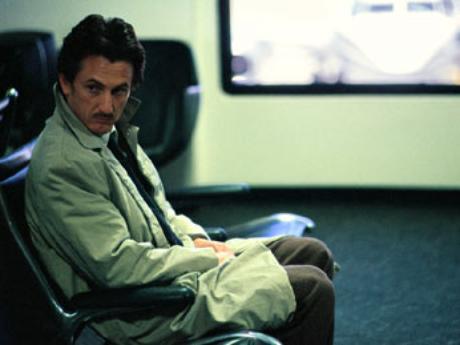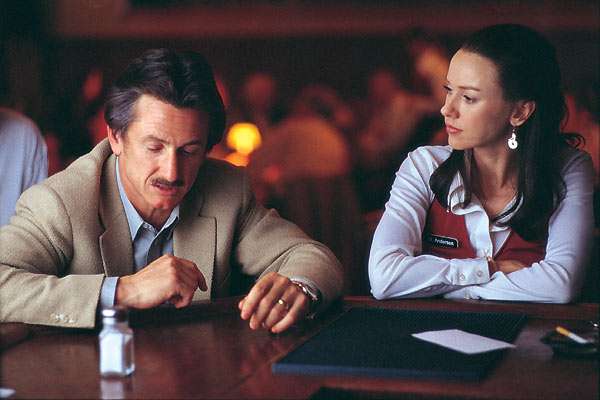Unbossed and unbought to the end, R.I.P. Shirley Chisholm 1924-2005.
Category: The Seventies
Death of a Salesman.

Then again, Samuel Byck wasn’t like most people either…in fact, that may be the biggest problem with this otherwise haunting film. Played for laughs in the Sondheim Assassins, Byck here is portrayed as a beaten-down American Everyman of the Willy Loman/Travis Bickle school, albeit one with a Pulp Fiction-like problem with authority and a frozen run of luck like you read about. But, while the film’s hold lies in Sean Penn’s powerful portrayal of a down-on-his-heels, borderline-stable guy who gets one too many doors slammed in his face (to Penn’s credit, his performance never really feels like a stunt, as it might have with a lesser actor), the real Samuel Byck was an even stranger bird than this film lets on. For example, there’s no mention of Byck’s protesting outside the White House in a Santa suit here, and the whole tapes-to-Leonard-Bernstein angle is played as straight as it possibly can be.
But, historical veracity aside, The Assassination of Richard Nixon still makes for a grim and compelling 90 minutes of darkening gloom, anchored by Sean Penn’s slow, fidgety burn. (Watts, Don Cheadle, Michael Wincott, and Jack Thompson all do good character work here, but the film is Penn’s, and he’s the only one to leave a mark.) The movie’s unrelenting downward trajectory is clear from the opening titles, and the final scene at BWI airport probably played a few minutes too long, particularly as Byck awaits boarding for his final destination. All in all, though, The Assassination of Richard Nixon is a somber inquiry into a life of quiet desperation, and a sad reminder that, regardless of what our American dream may promise, there are no guarantees in this world, and all too often no respite for the damned.

A Man of Constant Sorrow.
“It was a kind of nostalgia, like the immense sadness of a world at dusk. It was a sadness, a missing, a pain which could send one soaring back into the past. The sorrow of the battlefield could not normally be pinpointed to one particular event, or even one person. If you focused on any one event it would soon become a tearing pain. It was especially important, therefore, to avoid if possible focusing on the dead.”
 A quick literary shout-out: Hard to read and harder to put down, Bao Ninh’s The Sorrow of War, which I read on my plane ride back from Norfolk, is arguably the best anti/war novel I’ve read in over a decade. (I’ll always have a soft spot for Joseph Heller’s Catch-22 and Kurt Vonnegut’s Slaughterhouse Five, but the surrealism and absurdity of those two seem a world apart from the brutality of Ninh’s book.) Graphic and harrowing to the last, Sorrow tells the story of Kien, a North Vietnamese soldier full of youth and promise in the heady days of 1964. Unlike virtually everyone he knows, however, Kien actually manages to survive the Vietnam War to its conclusion in 1975, only to discover that peace remains an elusive ideal, and memory a cruel mistress.
A quick literary shout-out: Hard to read and harder to put down, Bao Ninh’s The Sorrow of War, which I read on my plane ride back from Norfolk, is arguably the best anti/war novel I’ve read in over a decade. (I’ll always have a soft spot for Joseph Heller’s Catch-22 and Kurt Vonnegut’s Slaughterhouse Five, but the surrealism and absurdity of those two seem a world apart from the brutality of Ninh’s book.) Graphic and harrowing to the last, Sorrow tells the story of Kien, a North Vietnamese soldier full of youth and promise in the heady days of 1964. Unlike virtually everyone he knows, however, Kien actually manages to survive the Vietnam War to its conclusion in 1975, only to discover that peace remains an elusive ideal, and memory a cruel mistress.
A kindred spirit to All Quiet on the Western Front, Ninh’s book doesn’t pull any punches — There are dark moments and harsh visions herein that will remain with me for some time to come. Still, it’s a very powerful book, and one worth reading if you have the strength for it.
Lemony Snicket, Sour Byck.
In today’s movie bin, a post-Eternal Sunshine Jim Carrey returns to hamming it up in the full trailer for Lemony Snicket’s A Series of Unfortunate Events, and Sean Penn (with the aid of 21 Grams co-star Naomi Watts and Don Cheadle) resurrects Samuel Byck (also featured in Stephen Sondheim’s Assassins) in the international teaser for The Assassination of Richard Nixon.
President Potty-Mouth?
The White House tsk-tsks John Kerry for the F-word. C’mon, now. Kerry’s youth-targeted outburst in Rolling Stone undoubtedly has a whiff of Gore-like “let-your-hair-down” calculation/desperation about it, but let’s not make a mountain out of a molehill here. We all know good and well that our presidents and political leaders have been swearing up a blue streak since time immemorial. (Richard “expletive deleted” Nixon is just the most notorious example.) And it wasn’t all that long ago that George “Major League” Dubya and Big Time needed their own mouths washed out with soap. So let he who is without sin cast the first #$%@ stone.
Ghost in the Machine.
Historian David Greenberg and the Washington Post examines Dubya’s stylistic debts to Richard Nixon.
Don’t Know Much About History.
Sorry about the lack of updates since Sunday….As it happens, encroaching November has frightened me into working harder on my US history orals site. My note-taking is still two months or so behind my reading, but – in case you’re interested – I’ve recently put up notes and reviews on the following books:
| John Morton Blum, Years of Discord: American Politics and Society, 1961-1974. William Leach, Land of Desire, Merchants, Power, and the Rise of a New American Culture. Lisa McGirr, Suburban Warriors: The Origins of the New American Right. Rick Perlstein, Before the Storm: Barry Goldwater and the Unmaking of the American Consensus. Ellen Schrecker, Many are the Crimes: McCarthyism in America. Robert Schulzinger, A Time for War: The United States and Vietnam, 1941-1975. Robert Weisbrot, Freedom Bound: A History of America’s Civil Rights Movement. Gary Wills, Reagan’s America: Innocents at Home. |
Updates to the orals site should come relatively frequently for the next few months, so expect more to come.
Shades of Watergate.
From out the mists of history, Watergate figures weigh in on Felonygate and this administration’s total lack of credibility: Nixon counsel John Dean calls the Bushies worse than his old employers, while Daniel Ellsberg argues that the Plumbers are back. Says Ellsberg of the Plame situation, “I see an almost identical pattern here [between his own experience and Plame’s]. Really, I don’t know of any analogy so close in the 30 years between now and then. This is not an everyday occurrence.” In related news, it turns out that the Bushies have lied again — this time, Wolfowitz & co. drastically overstated the health of the Iraqi oil industry, despite a Pentagon report to the contrary, so as to minimize the cost of Iraqi reconstruction for American taxpayers. Typical.
Forgotten Loot(ers).
Warriors, come out and play…With help from Columbia’s own KJ, David Greenberg attempts to explain the lack of NYC looters during the blackout, particularly as compared to the events of 1977. Also, in blackout news, the Dems (Edwards excepted) point the finger at Dubya’s lousy energy and infrastructure policies. Works for me.
Memory CREEP.
In an interview for a PBS documentary airing next week, former presidential aide Jeb Stuart Magruder now says Nixon personally authorized the Watergate break-in. Historian Stanley Kutler for one doesn’t buy it, and Magruder’s reasoning for his silence does sound a bit bogus. But you never know…
